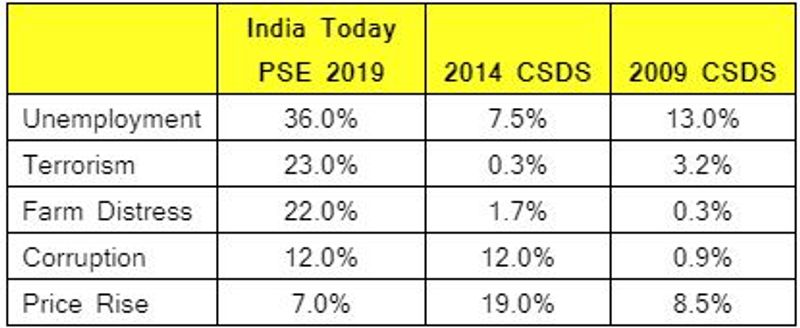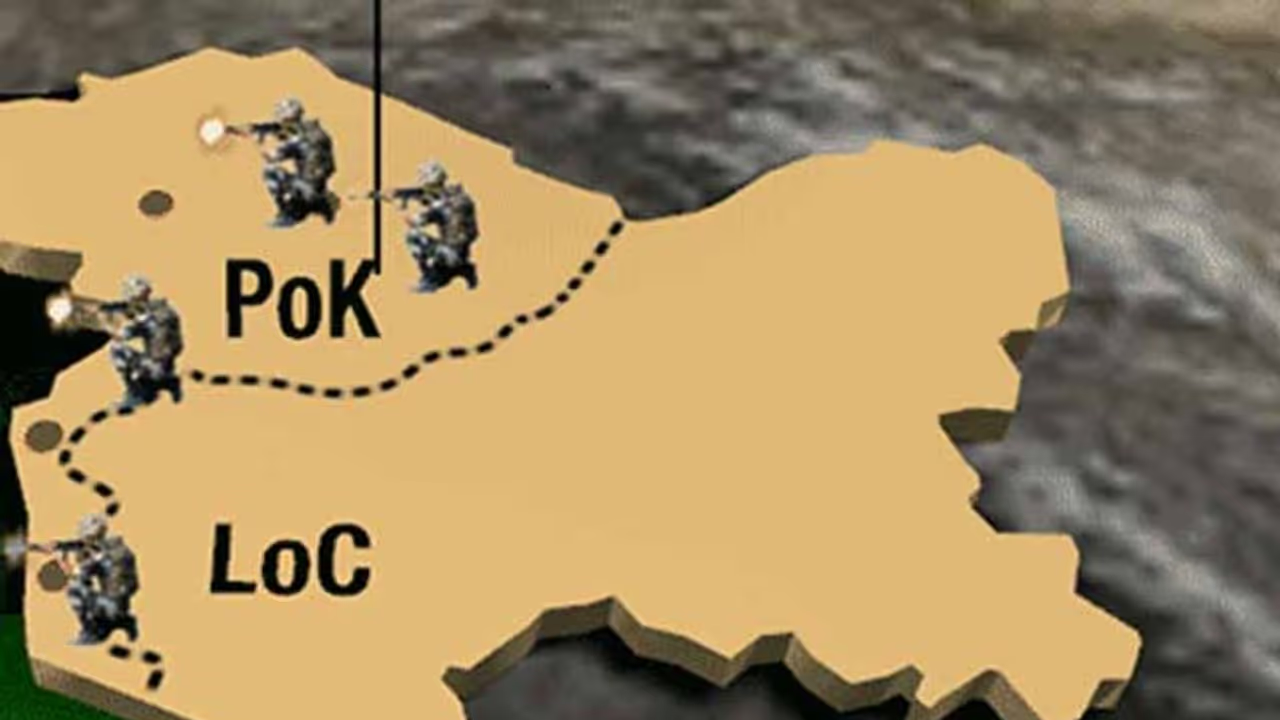The air strike, also known as surgical strike 2.0 and Pulwama attack have placed national security and terrorism among the top five issues during the 2019 elections; an issue that did not feature in the top 10 during the previous poll. We look at how the fervour of patriotism will help the BJP in the upcoming polls
The surgical strike 2.0 has charged the atmosphere in India. After almost five decades, the Indian Air Force crossed the Pakistan border and struck terrorist camps. While the BJP has claimed credit for its successful operation, the Opposition is accusing the party of politicizing the issue for electoral gains. The BJP has charged the opposition of playing into the hands of Pakistan and demoralizing our armed forces by questioning the number of casualties. Whether and to what extent this issue will impact the general elections is a topic of hot debate.
The air strike and Pulwama attack have placed National Security/Terrorism among the top five issues for 2019 elections. As per India Today Axis My India Political Stock Exchange, national security as an issue is ranked second after unemployment and is ahead of burning issues such as farm distress, corruption and price rise. Not only that, the survey has more worrying news for the Opposition:
· 66% believe that the strike was successful,
· 55% give credit to Modi for air strikes
· 77% credit Modi for release of Abhinandan
Top 5 Issues in Last 3 Elections:

Note: Scales are different, while PSE lists only 5 issues, CSDS comprises 15-20 issues.
Unemployment, corruption, price rise, farm distress and development are issues which feature regularly in the top five issues across elections in India. During the 2014 elections, price rise and corruption were the top two issues. In 2009, unemployment and price rise were the top two issues.
To assess the impact on general elections, we need to see whether the issue can hold onto its second position for couple of months more. In my opinion, it would, as elections are only few weeks away. The terrorist activities are not likely to stop. There have already been few incidents in Kashmir after Pulwama including a grenade attack in Jammu. The terrorists demoralized and cornered, are expected to keep up the ante. So, this issue will remain hot.
Now the question is, will it help BJP? For this we will have to see among which regions, gender and age brackets, the issue appeals to the most. PSE doesn’t provide the answers. In my opinion, the issue will work in urban and semi-urban areas where media penetration is very high. These areas have significant middle and rich class population which are traditional supporters of the BJP. There are 201 such seats and BJP won 104 of these in the 2014 elections. In rural areas, my hunch is that bread and butter issues like agricultural/rural distress, income growth, unemployment, could work more provided the Opposition is able to convert this election into a localized election. My point is corroborated by CrowdWisdom, a public prediction platform. As per the website, national security is among Top two issues both in Northern as well as Southern urban centers.
This issue could also resonate in BJP strongholds – North, Western and Central India - who resoundingly voted for the party in 2014 on the plank of Hindutava/Nationalism/Ram temple in states like Uttar Pradesh, Bihar, Rajasthan, Madhya Pradesh, Chhatisgarh, Gujarat, Maharashtra, Delhi, Himachal Pradesh, Uttarakhand from where the BJP won most of its seats. Since the BJP has maxed out in most of these states, this issue could help BJP contain or minimize losses in these states. In South and East of India the issue may not resonate as well, but here the BJP has not been strong either way.
In urban India, gains for the BJP mostly come from 18-25 age bracket, as per CrowdWisdom. The loss in vote share (post versus pre-airstrike) are mostly seen from the 46-55 age bracket. The reason for this could be that the 18-25 bracket people enjoy comparatively high media penetration and consume news mostly online and over social media. Around 8.1 crore first time voters have registered for the 2019 polls. They are expected to play a crucial role like last time. Majority of such voters in 2014 backed Modi and the BJP.
While un-employment is the top issue, we have to dissect it region-wise to understand the impact it could have. Western and Southern states have done well on the jobs front. Unemployment is a big issue in North, East and Central India. The surgical strike could create a fervor of patriotism and help the BJP negate the unemployment issue in key states. What the air strikes have managed to do is put national security issue on the forefront which was not even in top 10 earlier. This is worrisome for the Opposition. BJP will try to play up its narrative of Majboot verus Majboor Sarkar.
Many commentators are saying surgical strikes didn’t help the BJP win the UP elections. True, it was not the only reason, success of Ujjwala and expected positive outcomes of demonetization also helped the BJP score a massive victory. Few people have provided the example of 1999 and quoted the BJP’s vote share decline, but its seat tally remained the same and it came back to power after the Kargil war. Similarly, in 1967 elections, held after the 1965 war, INC lost vote share (-4%) as well as seats, but still managed to come back to power.
However, the BJP must tread on this path very carefully. It could also act as double-edged sword. God forbid any further losses on the Indian side of the scale of Pulwama will not be taken well by the Indian public who will chant the chorus of surgical strike 3.0. This may not be that easy again especially during elections.
To sum up, elections are not won or lost based on a single issue but a host of issues and the complex interplay among them. People are giving party and Modi credit for its decisive action against terrorism. It also suits the party’s Presidential style of election campaign. What many analysts miss is that the party doesn’t necessarily need to win more seats, mere retaining / maintaining its 2014 tally will also do. The surgical strike 2.0 is expected to help the party in this mission.
(Amitabh Tiwari is a political consultant, strategist and commentator advising political parties and leaders. He is a former corporate and investment banker and tweets @politicalbaaba.)
